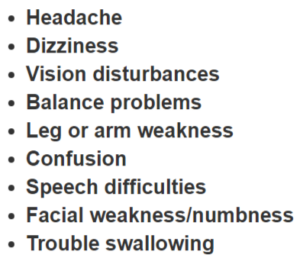TIA symptoms can be similar to those of a cancer metastasis in the brain.
Cancer survivors know that down the road, the disease may return.
A TIA is also a very frightening situation, because it’s a harbinger of a near-future major stroke – not to mention that it signals that something is seriously wrong with your body.
Even someone who’s never had cancer may somehow start wondering if new-onset symptoms are malignant tumors in the brain – either from a primary tumor there or metastases from a distant tumor such as an undetected melanoma or breast cancer.
Wondering if what “just happened” to you was a transient ischemic attack can be terrifying to anyone who knows something about these so-called mini strokes.
A TIA is a marker for a full-blown stroke soon to come, which is why a TIA is considered a medical emergency, even if there was only one symptom (such as double vision) and even if it lasted only 30 seconds.
A blood clot in the brain is always a very serious matter.
Brain Mets vs. TIA: the Difference
“By definition TIA symptoms must resolve within 24 hours,” says Lenny Cohen, MD, founder of Chicago Neurological Services; diplomate of the American Board of Psychiatry and Neurology.
“Metastasis won’t,” continues Dr. Cohen.
A malignant mass in the brain isn’t going anywhere. It can’t spontaneously disappear or resolve like a blood clot can.
And of course, the symptoms won’t persist for just 24 hours or under. You’ll have those symptoms very likely the next day, and the next, and every day or at least almost every day. And they’ll get worse without treatment.
And there’ll eventually be new symptoms strongly suggestive of cancer in the brain, such as seizures, vomiting, and personality or mood disturbances.
“Also, metastases are the product of existent cancer that in many cases has some additional symptoms (e.g., lung cancer with shortness of breath and coughing up blood, colon cancer with blood in the stool and weight loss, etc.),” explains Dr. Cohen.
“TIA is usually seen in those who have risk factors for cardiovascular disease — hypertension, high cholesterol, age over 65.”
Two additional risk factors for a transient ischemic attack are smoking and obesity.

Shutterstock/T.Den_Team
“To make things a bit more complicated, cancer by itself is a risk factor for TIA or stroke,” says Dr. Cohen.
Thus, it’s entirely possible to be experiencing a TIA while also having brain metastases.
If you experience any concerning symptoms, do not delay seeking medical attention.
A suspected TIA means a trip to the emergency room, NOT a scheduled visit with your primary care physician three days later.
TIA and brain metastases can cause the same symptoms. The big difference, as already noted by Dr. Cohen, is longevity of the symptoms.
Symptoms Shared by Both TIA and Brain Metastases

Cancers that Commonly Spread to the Brain

 Merging traditional medicine with alternative therapy, Dr. Cohen uses advanced science and a devotion to personalized care to provide men and women a unique approach focused on their long-term health and well-being.
Merging traditional medicine with alternative therapy, Dr. Cohen uses advanced science and a devotion to personalized care to provide men and women a unique approach focused on their long-term health and well-being.
 Lorra Garrick has been covering medical, fitness and cybersecurity topics for many years, having written thousands of articles for print magazines and websites, including as a ghostwriter. She’s also a former ACE-certified personal trainer.
Lorra Garrick has been covering medical, fitness and cybersecurity topics for many years, having written thousands of articles for print magazines and websites, including as a ghostwriter. She’s also a former ACE-certified personal trainer.
.













